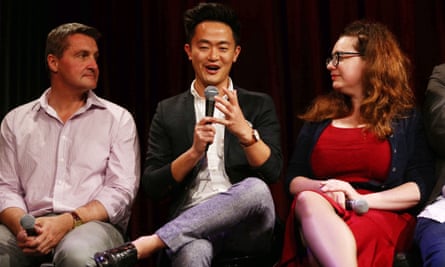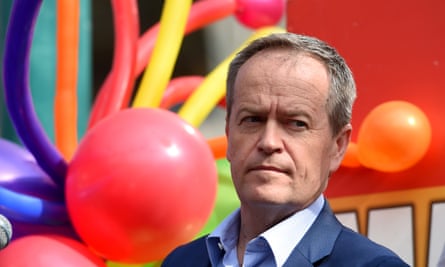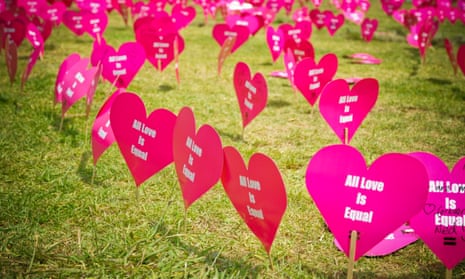As 2016 draws to a close without marriage equality in Australia, it is easy to forget that both major parties’ leaders started the year intending for it to be law by now.
The prime minister, Malcolm Turnbull, although he retained his predecessor’s policy to hold a plebiscite on the question, intended to hold the vote before the end of 2016 and expected it to be carried.
The opposition leader, Bill Shorten, pledged to legislate marriage equality within 100 days if Labor was elected.
Australian Marriage Equality planned election events in marginal seats, mostly held by the Coalition, where MPs or their opponents opposed same-sex marriage. AME opposed the plebiscite but said it was preparing for one all the same because its responsibility to LGBTI people was to be ready to be victorious the campaign.
The three people who did the most to stop the plebiscite were all LGBTI people on the progressive side of the issue, who viewed it as an obstacle to achieving marriage equality: Labor’s leader in the Senate, Penny Wong, the veteran LGBTI campaigner Rodney Croome and the former high court judge Michael Kirby.
Even before the July election Wong was campaigning inside caucus and in public against the idea. In the Lionel Murphy memorial lecture in June, she said a plebiscite would “licence hate speech”, echoing the line she had convinced Shorten to run days before that it was a “taxpayer-funded platform for homophobia”.
Shorten suggested Labor would not accept the “grubby deal” Turnbull had struck with the right wing of his party to hold a plebiscite but it was not until after the election that he began to lock himself into Wong’s position, talking about the harm it would do to vulnerable LGBTI people.
The election saw a bumper crop of MPs and senators in favour of marriage equality elected, enough to pass a free vote if the Coalition granted one, which it did not.
Pro-marriage equality MPs held out hope Labor would wave through the plebiscite eventually and several warned that blocking it could delay marriage equality for years.
In August Croome made his move, quitting as AME national director to pursue a harder line against the plebiscite. Croome now says it was a difficult decision but he was content because it gave him the freedom to campaign against the plebiscite.
“Polls showed that in a short time the country went from seeing a plebiscite as inevitable to wanting it voted down,” he tells Guardian Australia. “I feel proud of my small role in that big shift and in the plebiscite’s final defeat.”
Croome says AME’s work against the plebiscite was “constrained ... by the need to maintain a working relationship with the government should a plebiscite actually occur”.
The activist, who worked with the LGBTI groups Just Equal, Parents and Friends of Lesbians and Gays Australia (Pflag) and Rainbow Families, says he had a freer hand, commissioning research on the Irish referendum experience, “mustering community concern, running letter-writing campaigns and lobbying MPs”.
“This helped change the narrative to make the idea of a plebiscite unpalatable to the public and the Senate.”
For his part Kirby argued that in addition to causing harm to the LGBTI community, which Turnbull and moderate Liberals disputed, the plebiscite was “alien” to representative democracy.
That argument was also advanced by the Liberal senator Dean Smith but it was Kirby who Shorten cited as influential to his thinking when he addressed the National Press Club and when he introduced Labor’s marriage equality bill in September.
Noting that plebiscites had not been required for any other rights questions or conscience issues, Kirby argued that the LGBTI community was being singled out for unequal and discriminatory treatment, precisely the evil marriage equality was designed to cure.
The Coalition stuck to its guns: the marriage equality debate would be civil, it said, even in the face of evidence to the contrary. Marriage was an institution in which everyone, not just politicians or LGBTI people, had a stake. Defeat of the plebiscite meant delay. Voters had endorsed a plebiscite at the election and the majority wanted one, it said.
But the tide had turned. First a poll funded by Pflag showed the majority of LGBTI people opposed a plebiscite then polls of the general public, including Newspoll, showed a vote in parliament was more popular.
The public had either been persuaded of the problems of a plebiscite or had come to believe it was no longer the quickest and easiest option and now wanted a free vote.
Suggestions from the government that it could negotiate with Labor to modify the plebiscite proposal came to nothing.
First the Greens in late August, then the Nick Xenophon Team, Derryn Hinch and then finally Labor formalised their opposition. The Greens criticised Labor for waiting weeks to decide definitively but Labor argued it had given the arguments against the plebiscite weeks to run.

When Shorten announced that the Labor caucus had unanimously decided to block the plebiscite, Rainbow Families, Just Equal, Pflag and Croome were in the room to cheer and thank him for the decision.
When Turnbull introduced the plebiscite bill, he said that whether Australians voted yes or no that would be “the right answer, because it is theirs”. The plebiscite bill was voted down in early November.
AME’s co-chair Alex Greenwich and the Irish same-sex marriage campaigner Tiernan Brady, leading AME’s offshoot Australians for Equality (A4E), said what was good was that the debate about process was now over and the focus would now be the substance of marriage equality.
The disappointment among Coalition backers of same-sex marriage was palpable. Warren Entsch, whose private member’s bill had forced consideration of marriage equality in the Coalition party room in 2015, stepped away from the issue.
He railed against the fierce lobbying effort directed at him and other Coalition backers, and said LGBTI people had already contacted him expressing disappointment that the chance to pass marriage equality by a plebiscite had been lost.
Greenwich acknowledges “it’s been a tough year” but said “the campaign for marriage equality in Australia has never been in a better place to actually achieve the reform”. Relationships built with businesses, unions, civil society, religious leaders and community organisations in preparation for a plebiscite will no doubt be of use campaigning on the issue next year.
Labor and the Greens have no regrets about blocking the plebiscite. Labor’s equality spokeswoman, Terri Butler, tells Guardian Australia: “I’ve had nothing but positive responses from the LGBTI community. People didn’t want the indignity of their human rights being subjected to a national opinion poll – it was absolutely the right decision.”
The Greens’ LGBTI spokeswoman, Janet Rice, says she is “absolutely” sure it was the right decision, despite Entsch’s disappointment. “The feedback we’ve had from people is they think it was a great achievement. They want a vote in parliament and they thought a plebiscite was dangerous, divisive and expensive.”
What happens now depends on who you ask. Turnbull has said the government has “no plans” to advance marriage equality since the plebiscite was blocked but has not ruled out a free vote on the issue.

Some Coalition conservatives including the environment and energy minister, Josh Frydenberg, and the chief Nationals whip, George Christensen, have said the plebiscite is still government policy.
Moderates argue that the former prime minister Tony Abbott’s statement that the 44th parliament was the last in which Coalition parliamentarians would be bound opens the way to a free vote in the 45th parliament and believe the issue should return to the Liberal party room next year.
In November the Liberal MP Trevor Evans told Guardian Australia he believed same-sex marriage would “naturally” be considered again by the party room, it was likely to come up again this term and he would support a substantive marriage equality bill.
But he added the difficulty was “bringing a bill to the floor of parliament in the first place”. Coalition MPs do not have a free vote on procedural issues that could force consideration of a private members’ bill, Evans and other moderates including Trent Zimmerman have warned.
Smith, the only federal Liberal MP or senator to publicly oppose the plebiscite before it was blocked, now says the idea of plebiscites is “dead”.
He tells Guardian Australia “the prospects for a successful parliamentary vote on marriage, with a bill that responsibly deals with religious exemptions, are much brighter than ever before”.
In 2017 a Senate committee will examine the government’s same-sex marriage bill exposure draft, released by the attorney general, George Brandis, as the proposed bill to be considered at the plebiscite. Greenwich says the inquiry “is an opportunity for senators from across the political spectrum to work together to get the legislation right”.
Rice describes the release of the draft bill as “the one silver lining from the disastrous plebiscite proposal”. She says the committee will seek to improve the draft and make recommendations for what will become a cross-party marriage equality bill in the Senate.
The prospects of the bill are fair to good but question marks remain over what a small group of half a dozen socially conservative Labor senators will do, as the party will not bind its parliamentarians to vote for marriage equality until 2019.
Asked if he will vote for such a bill, Smith notes only that the use of private senators’ bills to advance reform of section 18C of the Racial Discrimination Act “demonstrates that senators are offered more freedoms, and opportunities to pursue legislative change than their house colleagues”.

If a marriage equality bill passes the Senate, it will go to the House of Representatives, which advocates hope will force the Liberal and Coalition party rooms to discuss a free vote.
In the meantime Croome and Brady, the executive director of A4E, both say the campaign must return to talking about the personal experiences of people who want the law to change. But, still, a difference of emphasis persists.
Brady tells Guardian Australia A4E will “build the broadest possible political support for marriage equality”.
He says marriage equality is the “will of the clear majority of Australians” and reflects Australian values of a fair go for all and equality. The Equality Campaign will remind MPs of those values and that “marriage equality is not going to go away as an issue”.
“If sustainable change is to be achieved, we need supporters of all political persuasions to see that marriage equality is consistent with their values,” Brady says. “In 2017 we will continue to ensure a diverse range of voices across Australia are heard in Canberra.”
AME and A4E point to the fact they addressed the Nationals party room this year to make the case for marriage equality to show their approach can win hearts and minds. “Our campaign has always been and will continue to be through positive and respectful engagement,” Brady says. “Equality will not be won through angry debates.
“We will continue to highlight human stories and encourage respectful national conversations to increase and strengthen our support in the parliament.”
Croome says he will encourage Liberals to seek a free vote or cross the floor and to persuade Labor members who are yet to support marriage equality to get on board.
But, he says, as with the plebiscite, the groups he works with “can take a firmer line” and “are not as constrained by the need to deal with the government” as AME and A4E are.
“We can be the ones reminding Liberals they don’t want this to be an issue at the next election,” Croome says. “We can take a stronger action against exemptions the government has proposed to accompany marriage equality that will allow discrimination against same-sex couples.”
Rice says all groups have have important roles to play and the different priorities of the various lobby groups is fine. “It’s the combination of their efforts that will eventually achieve marriage equality.”
As she explains, the path the Greens and Labor have chosen is a three-step process: first to defeat the plebiscite, second to agree on a bill and third to pass it.
And, as Butler says, success can only be guaranteed if the Liberals and Nationals are given a free vote.
In 2016 the road to equality was always going to face either the hurdle of an enormous national campaign or the detour of defeating the plebiscite to put the onus back on to the government or individual Coalition MPs to make it happen.
While some Coalition MPs warn defeating the plebiscite has delayed the cause, Croome, Greenwich, Smith and many others all say Australia is closer to achieving marriage equality than ever before.
